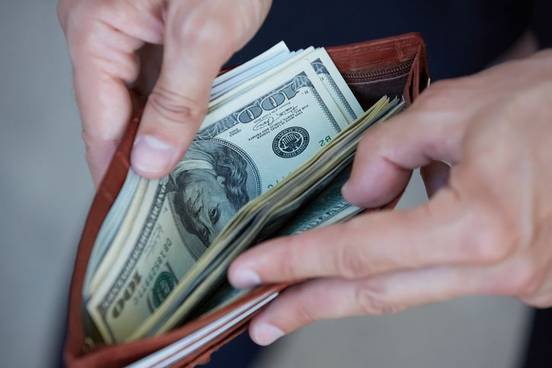
Capital
The first known use of the word capital is in early Middle English, in which it was used as an adjective meaning "of or relating to the head." It is derived from the Latin adjective capitalis, of the same meaning, which is based on the Latin name for "head," caput. The word was originally used to indicate something affecting the head, as in "a capital bruise" or "a capital wound."
Injuries to the head can be serious and even fatal; by extension, capital came to describe people or things threatening the loss of life—for example, a capital enemy. Such deadly uses of capital have since died away except in describing crimes, like murder, that are punishable by death or the punishment, as the loss of one’s head, inflicted for such crimes. The other familiar "head" sense of capital refers to a letter standing at the head of a page, passage, or line, and it was also in currency about the same time.
In Latin, capitalis also meant "chief" or "principal." That meaning was adopted into English in the 15th century to describe things of importance, such as a city, district, manor, or monastery. Nowadays, the noun capital is commonly used in reference to principal cities. Both the French and Italians adopted capitalis with this sense in the form capitale. Their word eventually came to refer to an essential stock of goods used to enter into business.
The other worde, the Italians call the Capitall, that is to saie, the Stocke or principall that the Marchant began with all.... And it is at your pleasure whether ye will use this worde Stocke in Englishe, or Capitale.
— J. Y. Christoffels, Notable Woorke Book Accompties, 1547
This financial word worked its way into English in the 16th century from either French or Italian. In time, capital gained more worth with additional meanings, including "accumulated goods to produce other goods" and "accumulated possessions calculated to bring in income."

Budget
Budget goes back to 15th-century England, where it was first a word for a pouch or bundle, and then for the contents of such a pouch. The Romans formed the Latin noun bulga, denoting a leather bag or knapsack, and this noun became bouge when it was taken into Middle French. The French diminutive form of the word, bougette, was also being used for a small bag. English borrowed the word as bowgette in the 15th century and by the early 17th century had settled on the spelling budget. At the time, the word was used for a leather pouch or wallet and for a leather or skin bottle.
In the 16th century, budget had also acquired the sense "a supply or stock," as in "a budget of contradictions" or "a budget of knowledge." The most common use of this sense was in referring to "a budget of news," such as one might receive in a long newsy letter or from a long-absent relative.
The budget of news which was prepared for her father.
— Anthony Trollope, The Warden, 1855
Because of its news associations, budget was eventually employed in the names of news periodicals in both the U.S. and Great Britain—for example, the publication The Pall Mall Budget, a now-defunct British weekly magazine.
The financial sense of budget is first attested in the 18th century, when it was used for a statement of the financial position of a government for the ensuing year based on estimates of expenditures and revenues. Such a budget was prepared by the Chancellor of the Exchequer for the approval of the House of Commons. By the 1850s, budget began being used in a nongovernmental sense and more generally for a financial account of a family or individual. From this developed the sense of "the money available, required, or assigned to a particular purpose."

Check
Chess is an ancient game, so it's not surprising that the word check was used in chess before banking. However, it should be noted that the game of chess did ultimately influence the development of the banking sense of the word. The etymology of check begins with the Persian word shāh, meaning literally "king." When the king in a game of chess was in danger, Persian players would say "shāh" as a warning to their opponent. Anglo-French players of the game adopted the call as eschec, which entered Middle English as chek.
Today, check is applied in a variety of senses having to do with stops, restraints, and hindrances—all of which evolved from the notion of checking the king in chess. One such use refers to something that is used for verifying accuracy, authenticity, correctness, etc., like the check (ticket) you receive when you check baggage. Originally, the check used in banking referred to such a device: a counterfoil, or detachable stub, of a money order that is retained by the issuer as verification of a transaction. Check was first applied to the counterfoil in the early 18th century and then to the bank draft—the written order directing a bank to pay money as instructed.

Underwrite
Underwriting goes back to the 14th century, when the word underwrite simply meant "to write under or at the end of something." For instance, in arithmetic a smaller number might be underwritten a larger one or a signature might be underwritten the terms of an agreement. It is through this act that early insurance underwriters got their name—that is, they wrote their names under insurance policies for the purpose of becoming answerable for a loss or damage.
The practice of insurance underwriting goes back to the 17th century.
The custome … doth impose the losse upon those Assurors which did first underwrite.
— Gerard de Malynes, Consuetudo, 1622
At first, underwriters undertook only marine insurance, and they would write their names under the proposals for insurance brought to them by ship owners, importers, exporters, and the like, indicating the percentage of risk they would assume. Today, underwriters will insure against practically anything, even against the risk of an audience member dying of laughter.

Blue-chip
Blue chip, meaning "a stock issue of high investment quality that usually pertains to a substantial, well-established company," was first noted in the late 19th century. From this meaning extended senses developed, such that blue chip applies to a consistently successful and profitable venture or enterprise, an outstandingly worthwhile and valuable property or asset, and an athlete rated as excellent or as an excellent prospect.
… businesses poised to increase earnings at a rate faster than the average blue chip.
— Carolyn Bigda and Kim Clark, Money, January/February 2013The sophomore who flirted with becoming the first Big Ten player since Magic Johnson in 1979 to average 17 points and seven assists, who nailed a 30-footer to send the South regional semifinal against Kansas to overtime, was nobody's blue chip early in high school.
— Carroll Rogers, The Atlanta Journal-Constitution, 6 Apr. 2013Snows Lake Vineyard looked like a blue chip addition to Lake County's economy when the 653-acre planting of premium wine grapes was proposed in 1998.
— Carl T. Hall, The San Francisco Chronicle, 17 Mar. 2002
The term as applied to the stock market derives from the actual use of blue chips in another type of game of stakes—poker. This quote from an 1874 edition of The San Francisco Chronicle nicely connects the two:
If times are good and the market flourishing, the game may be played with ‘blue chips,’ as a gambler would say, the very high-priced stocks being the favourites.
Blue chips in poker have the highest value, with red and white chips as lower denominations.

Invest
Invest was tailored from the Latin verb investire, meaning "to clothe," in the 16th century, and it was originally used with the same meaning as its Latin source. William Shakespeare uses it that way in As You Like It:
Invest me in my motley; give me leave / To speak my mind ...
The verb also sports the specific meanings of "to clothe in the symbols of office or honor" and "to install in an office or honor with customary ceremonies.”
That every Arch-bishop and Bishop, being … consecrated and invested shall be installed accordingly.
— Acts of Parliament, 1533-1534
The financial meaning of the word also descends from Latin, but it entered English via Italian in the early 17th century. In Italian, investire developed a special sense fabricated from the notion of "clothing" money in a new form. That use was attached to the English word invest, which eventually came to refer to a commitment of money to earn a return. This financial sense of invest is attested in the early 1600s in connection with trading by the East India Company.
Havinge left with us in goods and monies to bee invested in commodities fitt for Englande … to the vallew of 4000 li.
— T. Aldworth, Letter to E. India Co., 1613

Fine
The word fine comes from Anglo-French fin and Latin finis, both of which mean "end" or "boundary," and in its earliest uses in English, fine referred to various ends, limits, and boundaries.
The daie passed to the fyne.
— Emil Hausknecht, The Romaunce of the Sowdone of Babylone and of Ferumbras, ca. 1450The same hermyte ... By deth is passed the ffyn of his labour.
— John Lydgate, Minor Poems, ca. 1430All's Well that Ends Well. Still the fine's the crown. / Whate'er the course, the end is the renown.
— William Shakespeare, All's Well That Ends Well, 1604
The modern-day financial meaning of the word actually dates to the 15th century and refers to a sum imposed as punishment for an offense. Up until the 19th century, however, fine was also used for a sum paid as compensation or for exemption from punishment—in other words, money paid to avoid punishment or imprisonment. A common expression was to make fine, which referred to the exemption from punishment or the release from captivity by paying a sum of money.
If a man Indicted of Extortion, or Trespasse, puts himself upon the grace of the King, and makes a Fine, and after the party sues him for it …, and he pleades Not Guilty, hee shall have the Plea.
— J. March, R. Brook's Some New Cases of Time Hen. 8, Edward 6 & Mary, 1651
The word finance also emerged in the 15th century but from Anglo-French finer, meaning "to end" as well as "to pay," and similarly in English referred to an end or payment. In the 18th century, the word came to refer to pecuniary resources and the management of funds.

Income
When the noun income entered English in the 14th century, it wasn't a grand entrance: it was in the sense of "coming in." William Shakespeare noticed it, however, and used it in his narrative poem The Rape of Lucrece:
Pain pays the income of each precious thing.
Later senses of income refer to a person or thing that literally or figuratively comes in, such as an immigrant or a divine influence into the soul, but those senses are now obsolete.
It wasn't until the 17th century that income showed real value by becoming a word referring to money that is made through business or labor. But everything has its price: at the close of the 18th century, people in Great Britain were being taxed on the money referred to as income, and the United States government introduced a permanent income tax in the early 20th century.

Fund
The noun fund was established in English in the late 17th century. The foundation of the word is both French and Latin. The French base is the word fond, meaning "bottom," "stock or capital," or "piece of landed property"; the Latin base is fundus, meaning "bottom" or "piece of landed property." Apparently, English speakers were fond of the French fond since they used it as a variant of fund up until the late 19th century.
Initially, fund was used as a word for "bottom," both literally, as in "the fund of a bottle," and figuratively, "the fund of the soul." Then, borrowing on a sense of its French root, the word was used for a supply or stock of material things, like "a fund of brandy" or "a fund of timber," as well as immaterial things:
Nor had I a Fund of religious Knowledge.
— Daniel Defoe, The History and Remarkable Life of the truly Honourable Col. Jacque, 1723
It was around the end of the 17th century that fund began accumulating lexical stock as a word for a sum of money for the carrying on of a business or enterprise, for the support and maintenance of an institution, and for the support of a family and individual. The word was employed in its plural form in the early 18th century to refer to available money at one's disposal.





